FreeSWITCH内核开发
FreeSWITCH内核开发
1 环境
FreeSWITCH : FreeSWITCH-1.10.11-dev
OS: debian bullseye
gcc:10.2.1
gdb:10.1.99
2 FreeSWITCH启动流程
2.1 main函数的主要工作
FreeSWITCH在main函数中除了初始化异常处理程序,解析软交换启动参数(比如:-nc -nonat 参数和 -conf -mod -log -run -db -scripts -htdocs -base -storage -temp -cache -recordings -grammar -certs -sounds等工作目录)之外,其核心就是调用switch_core_init_and_modload()函数初始化FreeSWITCH内核以及加载外围模块。
switch_core_init_and_modload()函数调用完毕,也就是FreeSWITCH内核和外围模块启动完毕后,main函数会调用switch_core_runtime_loop()函数进入无限循环。对于后台启动的实例,它基本上什么都没做。对于从前台启动的系统,switch_core_runtime_loop()会调用switch_console_loop()函数以启动一个控制台接收用户的键盘输入并打印系统运行信息,比如:命令行输出和日志等。
当实例退出switch_core_runtime_loop()函数后,调用switch_core_destroy()函数清理系统资源。
2.2 switch_console_loop函数主要工作
switch_console_loop()函数分两种情况启动,一种是使用跨平台库libedit库接收用户按键并在控制台上打印信息,一种是直接启动while循环接收用户按键以及在控制台上打印信息。不通的是使用libedit库时,函数内部启动了console_thread()线程,在这里检测用户命令合法性,并将命令存入历史记录,以备将来再执行该命令时可以使用键盘上的箭头按键翻看历史命令。同样,使用非libedit库的switch_console_loop()函数中也实现了相同的功能。
二者最终都是调用switch_console_process()函数,在switch_console_process函数内部执行switch_console_execute()函数执行命令行解析,并最终调用switch_api_execute()函数,执行命令输入,并将执行结果存放到istream中,最后会被取出并打印到控制台上。
2.3 switch_api_execute函数主要工作
通过switch_loadable_module_get_api_interface()查找外面模块中实现的api接口。并执行api->function回调函数。外围模块加载参考后续章节。
2.4 switch_core_init_and_modload函数主要工作
- 调用switch_core_init()函数初始FreeSWITCH内核。
- 调用switch_load_network_lists()函数初始化FreeSWITCH工作网络。
- 调用switch_loadable_module_init()函数外围模块。
2.4.1 switch_core_init函数主要工作
初始FreeSWITCH工作目录,初始化软交换机状态机,加载软交换核心配置文件switch.conf等。
2.4.2 switch_loadable_module_init函数主要工作
调用switch_xml_open_cfg和switch_loadable_module_load_module_ex函数分别加载pre_load_modules.conf,modules.conf,post_load_modules.conf三个配置文件中定义的模块。优先加载pre_load_modules.conf配置的模块,然后加载modules.conf配置的模块,最后加载post_load_modules.conf配置的模块。这些文件存放在conf/autoload_configs目录下。
其中switch_loadable_module_load_module_ex函数启动在软交换模块中SWITCH_MODULE_LOAD_FUNCTION、SWITCH_MODULE_RUNTIME_FUNCTION定义的load和runtime函数。
2.5 switch_core_destroy函数主要工作
当实例退出switch_core_runtime_loop()函数后,main()函数调用switch_core_destroy()完成内核资源释放、外围模块卸载(调用switch_loadable_module_shutdown函数)等资源清理操作。
3 模块结构
3.1 模块定义函数
FreeSWITCH已经定义好模块的框架,开发者只需根据模块的框架结构实现自身业务即可。其中,预定义的模块函数,函数指针及参数列表定义在switch_types.h头文件中。
#define SWITCH_MODULE_LOAD_ARGS (switch_loadable_module_interface_t **module_interface, switch_memory_pool_t *pool) #define SWITCH_MODULE_RUNTIME_ARGS (void) #define SWITCH_MODULE_SHUTDOWN_ARGS (void) typedef switch_status_t (*switch_module_load_t) SWITCH_MODULE_LOAD_ARGS; typedef switch_status_t (*switch_module_runtime_t) SWITCH_MODULE_RUNTIME_ARGS; typedef switch_status_t (*switch_module_shutdown_t) SWITCH_MODULE_SHUTDOWN_ARGS; #define SWITCH_MODULE_LOAD_FUNCTION(name) switch_status_t name SWITCH_MODULE_LOAD_ARGS #define SWITCH_MODULE_RUNTIME_FUNCTION(name) switch_status_t name SWITCH_MODULE_RUNTIME_ARGS #define SWITCH_MODULE_SHUTDOWN_FUNCTION(name) switch_status_t name SWITCH_MODULE_SHUTDOWN_ARGS
#define SWITCH_MODULE_DEFINITION_EX(name, load, shutdown, runtime, flags) \ static const char modname[] = #name ; \ SWITCH_MOD_DECLARE_DATA switch_loadable_module_function_table_t name##_module_interface = { \ SWITCH_API_VERSION, \ load, \ shutdown, \ runtime, \ flags \ } #define SWITCH_MODULE_DEFINITION(name, load, shutdown, runtime) \ SWITCH_MODULE_DEFINITION_EX(name, load, shutdown, runtime, SMODF_NONE)
- SWITCH_MODULE_LOAD_FUNCTION:模块加载函数,负责系统启动时或运行时加载模块,可以进行配置读取及资源初始化。
- SWITCH_MODULE_SHUTDOWN_FUNCTION:模块卸载函数,负载模块卸载及相关资源回收。
- SWITCH_MODULE_RUNTIME_FUNCTION:模块运行时函数,可以启动线程处理请求,监听socket等。
- SWITCH_MODULE_DEFINITION:模块定义函数,告知系统核心加载模块时调用load函数进行初始化,启动新线程执行runtime,卸载时调用shutdown函数清理资源。
3.2 模块加载流程
通过 switch_loadable_module_load_module() 函数加载模块,函数调用链如下:
switch_loadable_module_load_module => switch_loadable_module_load_module_ex => switch_loadable_module_load_file => switch_loadable_module_process => switch_core_launch_thread
=> switch_loadable_module_exec
在通过 switch_loadable_module_load_file()函数中通过switch_dso_data_sym()函数根据定义的 XXX_module_interface 从动态库里面获取回调函数指针,使用 switch_loadable_module_function_table_t 数据结构进行回调函数绑定。switch_loadable_module_exec 函数为独立线程中运行,模块运行时通过 module->switch_module_runtime触发。
所以整个模块加载过程如下:
main => switch_core_init_and_modload => switch_core_init => switch_loadable_module_init => switch_loadable_module_load_module
在switch_loadable_module_init()函数中首先加载系统核心模块:
switch_loadable_module_load_module_ex("", "CORE_SOFTTIMER_MODULE", SWITCH_FALSE, SWITCH_FALSE, &err, \
SWITCH_LOADABLE_MODULE_TYPE_COMMON, event_hash); switch_loadable_module_load_module_ex("", "CORE_PCM_MODULE", SWITCH_FALSE, SWITCH_FALSE, &err, \
SWITCH_LOADABLE_MODULE_TYPE_COMMON, event_hash); switch_loadable_module_load_module_ex("", "CORE_SPEEX_MODULE", SWITCH_FALSE, SWITCH_FALSE, &err, \
SWITCH_LOADABLE_MODULE_TYPE_COMMON, event_hash);
然后再通过switch_xml_open_cfg ()函数依次加载下列文件中定义的模块:
- pre_load_modules.conf
- modules.conf
- post_load_modules.conf
xml配置文件加载流程如下:
main => switch_core_init_and_modload => switch_core_init => switch_xml_init => switch_xml_open_root => XML_OPEN_ROOT_FUNCTION
其中 SWITCH_GLOBAL_filenames 变量定义在main()函数中的 switch_core_set_globals()函数内部进行设置:
if (!SWITCH_GLOBAL_filenames.conf_name && (SWITCH_GLOBAL_filenames.conf_name = (char *) malloc(BUFSIZE))) { switch_snprintf(SWITCH_GLOBAL_filenames.conf_name, BUFSIZE, "%s", "freeswitch.xml"); }
其中XML_OPEN_ROOT_FUNCTION实现如下:
static switch_xml_open_root_function_t XML_OPEN_ROOT_FUNCTION = (switch_xml_open_root_function_t)__switch_xml_open_root; SWITCH_DECLARE_NONSTD(switch_xml_t) __switch_xml_open_root(uint8_t reload, const char **err, void *user_data) { char path_buf[1024]; uint8_t errcnt = 0; switch_xml_t new_main, r = NULL; if (MAIN_XML_ROOT) { if (!reload) { r = switch_xml_root(); goto done; } } switch_snprintf(path_buf, sizeof(path_buf), "%s%s%s", SWITCH_GLOBAL_dirs.conf_dir, SWITCH_PATH_SEPARATOR, \
SWITCH_GLOBAL_filenames.conf_name); if ((new_main = switch_xml_parse_file(path_buf))) { *err = switch_xml_error(new_main); switch_copy_string(not_so_threadsafe_error_buffer, *err, sizeof(not_so_threadsafe_error_buffer)); *err = not_so_threadsafe_error_buffer; if (!zstr(*err)) { switch_xml_free(new_main); new_main = NULL; errcnt++; } else { *err = "Success"; switch_xml_set_root(new_main); } } else { *err = "Cannot Open log directory or XML Root!"; errcnt++; } if (errcnt == 0) { r = switch_xml_root(); } done: return r; }
SWITCH_GLOBAL_filenames.conf_name即为freeswitch.xml文件,这个文件是FreeSWITCH中xml文件的总入口。并在freeswitch.xml文件中配置有加载各个模块的参数:
<section name="configuration" description="Various Configuration"> <X-PRE-PROCESS cmd="include" data="autoload_configs/*.xml"/> </section>
控制台动态加载流程,在fs_cli中可以使用load及reload加载模块,具体流程如下:
fs_cli => load ... => SWITCH_STANDARD_API(load_function) => switch_loadable_module_load_module fs_cli => reload ... => SWITCH_STANDARD_API(reload_function) => switch_loadable_module_unload_module => switch_loadable_module_load_module
3.3 关键数据结构
3.3.1 switch_loadable_module_t
作用:用于定义模块信息。
结构体定义:
struct switch_loadable_module { char *key; //模块文件名 char *filename; //模块文件路径(动态库路径) int perm; //定义模块是否允许被卸载 switch_loadable_module_interface_t *module_interface; //模块接口(由switch_module_load函数赋值) switch_dso_lib_t lib; //动态库句柄(dlopen函数返回) switch_module_load_t switch_module_load; //模块加载函数 switch_module_runtime_t switch_module_runtime; //模块运行时函数 switch_module_shutdown_t switch_module_shutdown; //模块关闭(卸载)函数 switch_memory_pool_t *pool; //模块内存池 switch_status_t status; //switch_module_shutdown 函数的返回值 switch_thread_t *thread; switch_bool_t shutting_down; //模块是否关闭 switch_loadable_module_type_t type; };
typedef struct switch_loadable_module switch_loadable_module_t;
3.3.2 switch_loadable_module_interface_t
作用:模块接口(入口)。
结构体定义:
/*! \brief The abstraction of a loadable module 模块接口(入口) */ struct switch_loadable_module_interface { /*! the name of the module 模块的名称 */ const char *module_name; /*! the table of endpoints the module has implemented 模块endpoint的具体实现 */ switch_endpoint_interface_t *endpoint_interface; /*! the table of timers the module has implemented 模块timer的具体实现 */ switch_timer_interface_t *timer_interface; /*! the table of dialplans the module has implemented 模块dialplan的具体实现 */ switch_dialplan_interface_t *dialplan_interface; /*! the table of codecs the module has implemented 模块编解码的具体实现 */ switch_codec_interface_t *codec_interface; /*! the table of applications the module has implemented 模块提供的app工具的具体实现 */ switch_application_interface_t *application_interface; /*! the table of chat applications the module has implemented 模块提供的文本聊天app工具的具体实现 */ switch_chat_application_interface_t *chat_application_interface; /*! the table of api functions the module has implemented 模块提供的api具体实现 */ switch_api_interface_t *api_interface; /*! the table of json api functions the module has implemented 模块提供的json格式api的具体实现 */ switch_json_api_interface_t *json_api_interface; /*! the table of file formats the module has implemented 模块支持的文件格式的具体实现(比如mp4、mkv等文件格式) */ switch_file_interface_t *file_interface; /*! the table of speech interfaces the module has implemented 模块使用的speech接口实现 */ switch_speech_interface_t *speech_interface; /*! the table of directory interfaces the module has implemented 模块使用的directory接口实现 */ switch_directory_interface_t *directory_interface; /*! the table of chat interfaces the module has implemented 模块使用的chat接口实现 */ switch_chat_interface_t *chat_interface; /*! the table of say interfaces the module has implemented 模块使用的say接口实现 */ switch_say_interface_t *say_interface; /*! the table of asr interfaces the module has implemented 模块使用的asr接口实现 */ switch_asr_interface_t *asr_interface; /*! the table of management interfaces the module has implemented 模块使用的管理接口实现 */ switch_management_interface_t *management_interface; /*! the table of limit interfaces the module has implemented 模块使用的limit接口实现 */ switch_limit_interface_t *limit_interface; /*! the table of database interfaces the module has implemented 模块使用的limit接口实现*/ switch_database_interface_t *database_interface; switch_thread_rwlock_t *rwlock; //模块使用的锁 int refs; //模块锁的计数器 switch_memory_pool_t *pool;//模块内存池 }; typedef struct switch_loadable_module_interface switch_loadable_module_interface_t;
使用 switch_loadable_module_create_module_interface()函数 来创建 switch_loadable_module_interface_t 实例
SWITCH_DECLARE(switch_loadable_module_interface_t *) switch_loadable_module_create_module_interface(switch_memory_pool_t *pool, \
const char *name) { switch_loadable_module_interface_t *mod; mod = switch_core_alloc(pool, sizeof(switch_loadable_module_interface_t)); switch_assert(mod != NULL); mod->pool = pool; mod->module_name = switch_core_strdup(mod->pool, name); switch_thread_rwlock_create(&mod->rwlock, mod->pool); return mod; }
使用 switch_loadable_module_create_interface 来创建模块里面的子接口,示例如下:
*module_interface = switch_loadable_module_create_module_interface(pool, modname); rtc_endpoint_interface = switch_loadable_module_create_interface(*module_interface, SWITCH_ENDPOINT_INTERFACE); rtc_endpoint_interface->interface_name = "rtc"; rtc_endpoint_interface->io_routines = &rtc_io_routines; rtc_endpoint_interface->state_handler = &rtc_event_handlers; rtc_endpoint_interface->recover_callback = rtc_recover_callback;
具体实现如下:
SWITCH_DECLARE(void *) switch_loadable_module_create_interface(switch_loadable_module_interface_t *mod, \
switch_module_interface_name_t iname) { switch (iname) { case SWITCH_ENDPOINT_INTERFACE: ALLOC_INTERFACE(endpoint) case SWITCH_TIMER_INTERFACE: ALLOC_INTERFACE(timer) case SWITCH_DIALPLAN_INTERFACE: ALLOC_INTERFACE(dialplan) case SWITCH_CODEC_INTERFACE: ALLOC_INTERFACE(codec) case SWITCH_APPLICATION_INTERFACE: ALLOC_INTERFACE(application) case SWITCH_CHAT_APPLICATION_INTERFACE: ALLOC_INTERFACE(chat_application) case SWITCH_API_INTERFACE: ALLOC_INTERFACE(api) case SWITCH_JSON_API_INTERFACE: ALLOC_INTERFACE(json_api) case SWITCH_FILE_INTERFACE: ALLOC_INTERFACE(file) case SWITCH_SPEECH_INTERFACE: ALLOC_INTERFACE(speech) case SWITCH_DIRECTORY_INTERFACE: ALLOC_INTERFACE(directory) case SWITCH_CHAT_INTERFACE: ALLOC_INTERFACE(chat) case SWITCH_SAY_INTERFACE: ALLOC_INTERFACE(say) case SWITCH_ASR_INTERFACE: ALLOC_INTERFACE(asr) case SWITCH_MANAGEMENT_INTERFACE: ALLOC_INTERFACE(management) case SWITCH_LIMIT_INTERFACE: ALLOC_INTERFACE(limit) case SWITCH_DATABASE_INTERFACE: ALLOC_INTERFACE(database) default: switch_log_printf(SWITCH_CHANNEL_LOG, SWITCH_LOG_WARNING, "Invalid Module Type!\n"); return NULL; } }
3.3.3 switch_endpoint_interface_t
作用:Endpoints入口。
结构体定义:
struct switch_endpoint_interface { /*! the interface's name */ // endpoint名称,比如:"rtc" const char *interface_name; /*! channel abstraction methods */ // endpoint对应的io操作回调函数 switch_io_routines_t *io_routines; /*! state machine methods */ // endpoint对应的事件处理回调函数 switch_state_handler_table_t *state_handler; /*! private information */ //endpoint私有参数配置(比如编码格式、采样率等) void *private_info; switch_thread_rwlock_t *rwlock; //endpoint锁 int refs; //endpoint锁的引用次数 switch_mutex_t *reflock; //endpoint引用锁 /* parent */ switch_loadable_module_interface_t *parent; //endpoint所属模块 /* to facilitate linking */ struct switch_endpoint_interface *next; //next指针 switch_core_recover_callback_t recover_callback; // endpoint对应的recover回调函数 }; typedef struct switch_endpoint_interface switch_endpoint_interface_t;
3.3.4 switch_io_routines
作用:存储io操作的回调函数。
结构体定义:
struct switch_io_routines { /*! creates an outgoing session from given session, caller profile */ switch_io_outgoing_channel_t outgoing_channel; //创建外呼channel的回调函数 /*! read a frame from a session */ switch_io_read_frame_t read_frame; //读session音频数据的回调函数 /*! write a frame to a session */ switch_io_write_frame_t write_frame; // 写session音频数据的回调函数 /*! send a kill signal to the session's channel */ switch_io_kill_channel_t kill_channel; // kill信号处理函数,用于处理channel接收的kill信号 /*! send a string of DTMF digits to a session's channel */ switch_io_send_dtmf_t send_dtmf; //send dtmf操作的回调函数,用于处理channel接收的DTMF字符串 /*! receive a message from another session */ switch_io_receive_message_t receive_message; // 处理channel消息的回调函数,用于处理其它channel发来的消息 /*! queue a message for another session */ switch_io_receive_event_t receive_event; //发送channel消息的回调函数,用于向目标session发送自定义事件(比如rtc session、rtmp session等 /*! change a sessions channel state */ switch_io_state_change_t state_change; //channel状态修改的回调函数 /*! read a video frame from a session */ switch_io_read_video_frame_t read_video_frame; //读session视频数据的回调函数 /*! write a video frame to a session */ switch_io_write_video_frame_t write_video_frame; //写session视频数据的回调函数 /*! read a video frame from a session */ switch_io_read_text_frame_t read_text_frame; //读session文本数据的回调函数 /*! write a video frame to a session */ switch_io_write_text_frame_t write_text_frame; //写session文本数据的回调函数 /*! change a sessions channel run state */ switch_io_state_run_t state_run; // 改变session的运行状态,保留 /*! get sessions jitterbuffer */ switch_io_get_jb_t get_jb; //获取session的jitter_buffer void *padding[10]; }; typedef struct switch_io_routines switch_io_routines_t;
3.3.5 switch_state_handler_table_t
作用:存储状态机的回调函数
结构体定义:
struct switch_state_handler_table { /*! executed when the state changes to init //channel进入 CS_INIT 状态的回调函数 */ switch_state_handler_t on_init; /*! executed when the state changes to routing // channel进入 CS_ROUTING 状态的回调函数*/ switch_state_handler_t on_routing; /*! executed when the state changes to execute // channel进入 CS_EXECUTE 状态的回调函数,用于执行操作*/ switch_state_handler_t on_execute; /*! executed when the state changes to hangup channel进入 CS_HANGUP 状态的回调函数// */ switch_state_handler_t on_hangup; /*! executed when the state changes to exchange_media // channel进入 CS_EXCHANGE_MEDIA 状态的回调函数*/ switch_state_handler_t on_exchange_media; /*! executed when the state changes to soft_execute // channel进入 CS_SOFT_EXECUTE 状态的回调函数,用于从其它channel接收或发送数据*/ switch_state_handler_t on_soft_execute; /*! executed when the state changes to consume_media // channel进入 CS_CONSUME_MEDIA 状态的回调函数*/ switch_state_handler_t on_consume_media; /*! executed when the state changes to hibernate //channel进入 CS_HIBERNATE 状态的回调函数,sleep操作*/ switch_state_handler_t on_hibernate; /*! executed when the state changes to reset //channel进入 CS_RESET 状态的回调函数 */ switch_state_handler_t on_reset; /*! executed when the state changes to park //channel进入 CS_PARK 状态的回调函数 */ switch_state_handler_t on_park; /*! executed when the state changes to reporting //channel进入 CS_REPORTING 状态的回调函数*/ switch_state_handler_t on_reporting; /*! executed when the state changes to destroy //channel进入 CS_DESTROY 状态的回调函数*/ switch_state_handler_t on_destroy; int flags; void *padding[10]; }; typedef struct switch_state_handler_table switch_state_handler_table_t;
switch_core_state_machine.c文件switch_core_session_run()函数中使用 STATE_MACRO 触发,部分触发代码如下:
case CS_ROUTING: /* Look for a dialplan and find something to do */ STATE_MACRO(routing, "ROUTING"); break; case CS_RESET: /* Reset */ STATE_MACRO(reset, "RESET"); break; /* These other states are intended for prolonged durations so we do not signal lock for them */ case CS_EXECUTE: /* Execute an Operation */ STATE_MACRO(execute, "EXECUTE"); break; case CS_EXCHANGE_MEDIA: /* loop all data back to source */ STATE_MACRO(exchange_media, "EXCHANGE_MEDIA"); break; case CS_SOFT_EXECUTE: /* send/recieve data to/from another channel */ STATE_MACRO(soft_execute, "SOFT_EXECUTE"); break; case CS_PARK: /* wait in limbo */ STATE_MACRO(park, "PARK"); break; case CS_CONSUME_MEDIA: /* wait in limbo */ STATE_MACRO(consume_media, "CONSUME_MEDIA"); break; case CS_HIBERNATE: /* sleep */ STATE_MACRO(hibernate, "HIBERNATE"); break;
3.4 模块开发实例
3.4.1 实现一个api
以模块mod_bsoft为例。实现一个hello_bsoft api接口
在src/mod/endpoints目录下创建mod_bsoft目录。
把模块名加入到modules.conf中,make时根据此文件选择编译哪些模块,并生成相应的makefile文件。
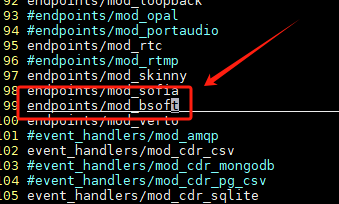
在configure.ac中加入mod_bsoft的Makefile配置:

在mod_bsoft目录中创建mod_bsoft.c文件。代码如下:
/************************************************************************* > File Name: mod_bsoft.c > Author: zhongqf > Mail: zhongqf.cn@gmail.com > Created Time: 2023-11-22 15:42:03 ************************************************************************/ #include<switch.h> SWITCH_MODULE_LOAD_FUNCTION(mod_bsoft_load); SWITCH_MODULE_RUNTIME_FUNCTION(mod_bsoft_runtime); SWITCH_MODULE_SHUTDOWN_FUNCTION(mod_bsoft_shutdown); SWITCH_MODULE_DEFINITION(mod_bsoft,mod_bsoft_load,mod_bsoft_shutdown,mod_bsoft_runtime); SWITCH_STANDARD_API(hello_bsoft) { switch_log_printf(SWITCH_CHANNEL_LOG,SWITCH_LOG_NOTICE,"hello bsoft!\n"); return SWITCH_STATUS_SUCCESS; } SWITCH_MODULE_LOAD_FUNCTION(mod_bsoft_load) { switch_api_interface_t *api_interface; *module_interface = switch_loadable_module_create_module_interface(pool,modname); SWITCH_ADD_API(api_interface,"hello_bsoft","hello bosft API",hello_bsoft,"syntax"); return SWITCH_STATUS_SUCCESS; } SWITCH_MODULE_RUNTIME_FUNCTION(mod_bsoft_runtime) { int i=0; while(i<=10) { switch_log_printf(SWITCH_CHANNEL_LOG,SWITCH_LOG_NOTICE,"hello from bsoft!\n"); switch_yield(100000); i++; } return SWITCH_STATUS_TERM; } SWITCH_MODULE_SHUTDOWN_FUNCTION(mod_bsoft_shutdown) { switch_log_printf(SWITCH_CHANNEL_LOG,SWITCH_LOG_NOTICE,"mod_bsoft shutdown!\n"); return SWITCH_STATUS_SUCCESS; }
编写makefile.am文件:
include $(top_srcdir)/build/modmake.rulesam MODNAME=mod_bsoft mod_LTLIBRARIES = mod_bsoft.la mod_bsoft_la_SOURCES = mod_bsoft.c mod_bsoft_la_CFLAGS = $(AM_CFLAGS) mod_bsoft_la_LIBADD = $(switch_builddir)/libfreeswitch.la mod_bsoft_la_LDFLAGS = -avoid-version -module -no-undefined -shared
执行freeswitch源码目录下执行
./bootstrap.sh && ./configure --prefix=/opt/freeswitch_install/
可以看到mod_bsoft目录下产生了一个Makefile文件。此时可以执行在此目录下编译单独编译模块,并部署到安装目录下。
make && make install
也可以在freeswitch元目录下执行:
make mod_bsoft && make mod_bsoft-install
在freeswitch安装目录下可以看到mod_bsoft模块相关文件:
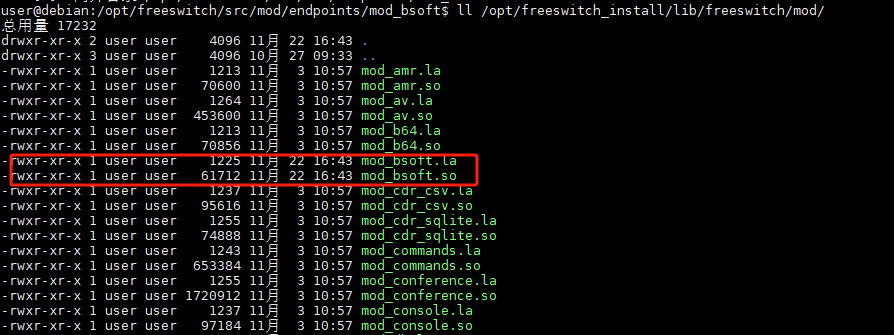
在控制台中加载mod_bsoft模块,可以看到模块可以正常加载,并打印runtime中的日志。
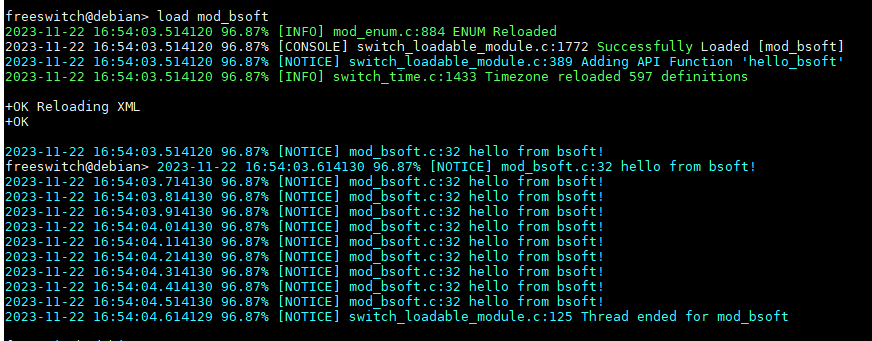
可以调用模块中定义的hello_bsoft接口

可以正常卸载:

3.4.2 实现一个Dialplan
在SWITCH_MODULE_LOAD_FUNCTION中新增一个Dialplan变量声明:
switch_dialplan_interface_t *dp_interface;
在*module_interface之后,向Freeswitch核心注册一个新的Dialplan,并设置一个回调函数:
SWITCH_ADD_DIALPLAN(dp_interface,"bsoft_dialplan",bsoft_dialplan_hunt);
实现这个回调函数:
SWITCH_STANDARD_DIALPLAN(bsoft_dialplan_hunt) { switch_caller_extension_t * extension = NULL; switch_channel_t *channel = switch_core_session_get_channel(session); if(!caller_profile) { caller_profile =switch_channel_get_caller_profile(channel); } switch_log_printf(SWITCH_CHANNEL_SESSION_LOG(session),SWITCH_LOG_INFO, "Processing %s <%s>->%s in context %s\n", caller_profile->caller_id_name, caller_profile->caller_id_number, caller_profile->destination_number, caller_profile->context ); extension = switch_caller_extension_new(session,"bsoft_dialplan","bsoft_dialplan"); if(!extension) abort(); switch_caller_extension_add_application(session,extension,"log","Info , bsoft_dialplan"); return extension; }
在控制台执行:
freeswitch@debian> originate user/1001 9999 bsoft_dialplan

其中9999为Extension,bsoft_dialplan为Dialplan,Context没设置,默认为default。
3.4.3 实现一个application
在SWITCH_MODULE_LOAD_FUNCTION中新增一个Application变量声明
switch_application_interface_t *app_interface;
在*module_interface之后,向Freeswitch核心注册一个新的Application,并设置一个回调函数:
SWITCH_ADD_APP(app_interface,"bsoft_app","bsoft_app demo","bsoft_app Demo",bsoft_app_fun,"[name]",SAF_SUPPORT_NOMEDIA);
实现这个函数:
SWITCH_STANDARD_APP(bsoft_app_fun)
{
}
通过控制台执行show modules mod_bsoft命令可以看到刚刚实现的api 、dialplan和application:

3.4.4 事件订阅
在mod_bsoft_load()函数中添加 switch_event_bind()。
switch_event_bind("mod_bsoft", SWITCH_EVENT_ALL, SWITCH_EVENT_SUBCLASS_ANY, on_channel_progress, NULL);
并实现事件侦听函数:
static void on_channel_progress(switch_event_t *event) { switch_log_printf(SWITCH_CHANNEL_LOG,SWITCH_LOG_INFO,"event id:%d owner:%s event name:%s\n",
event->event_id,event->owner,event->subclass_name); }
4 调试
4.1 设置日志级别
mod_sofia模块接口设置sofia sip协议栈的日志级别,0关闭调试日志,9最高包括函数调用退出流程的日志打印。all会影响所有模块的日志级别。
sofia loglevel <all|default|tport|iptsec|nea|nta|nth_client|nth_server|nua|soa|sresolv|stun> [0-9]
开启sofia最高级别日志:
fsctl loglevel 6
sofia loglevel all 9
关闭sofia日志
sofia loglevel all 0
4.2 堆栈打印
使用系统库函数打印堆栈来查看调用流程。以通过堆栈来查看channel初始化流程为例。在FreeSWITCH呼叫业务中,我们最常见的日志就是呼叫通道的启动信息,日志如下:
[NOTICE] switch_channel.c:1142 New Channel sofia/internal/1001@192.168.1.2 [c30832f7-7af7-4517-9ea9-310f6c4da6a4]
这个日志表示一个新的会话channel初始完成。定位到src/switch_channel.c文件switch_channel_set_name()函数。在New Channel 信息打印之后执行print_stack()函数。

实现print_stack()函数:
#include <execinfo.h> static void print_stack() { void *stacktrace[99]; char **symbols; int size,i; size = backtrace(stacktrace,99); symbols = backtrace_symbols(stacktrace,size); if(!symbols) { return; } for(i=0;i<size;i++) { switch_log_printf(SWITCH_CHANNEL_LOG,SWITCH_LOG_NOTICE,"STACK:%s\n",symbols[i]); } free(symbols); }
重新编译和安装FreeSWITCH。启动FreeSWITCH后发起INVITE呼叫。
switch_channel.c:1161 New Channel sofia/internal/1001@192.168.1.2 [1f1d7158-c050-463a-893b-ce7be864d7dd] switch_channel.c:1140 STACK:/opt/freeswitch_install/lib/libfreeswitch.so.1(+0x6268f) [0x7fdd7190468f] switch_channel.c:1140 STACK:/opt/freeswitch_install/lib/libfreeswitch.so.1(switch_channel_set_name+0x176) [0x7fdd7190c096] switch_channel.c:1140 STACK:./lib/freeswitch/mod/mod_sofia.so(+0x551a4) [0x7fdd6de7b1a4] switch_channel.c:1140 STACK:./lib/freeswitch/mod/mod_sofia.so(+0x53ed2) [0x7fdd6de79ed2] switch_channel.c:1140 STACK:/home/freeswitch-1.10.10-dev/lib/libsofia-sip-ua.so.0(+0xc7e1b) [0x7fdd710d1e1b] switch_channel.c:1140 STACK:/home/freeswitch-1.10.10-dev/lib/libsofia-sip-ua.so.0(+0x135313) [0x7fdd7113f313] switch_channel.c:1140 STACK:/home/freeswitch-1.10.10-dev/lib/libsofia-sip-ua.so.0(su_base_port_getmsgs+0x73) [0x7fdd7113f09d] switch_channel.c:1140 STACK:/home/freeswitch-1.10.10-dev/lib/libsofia-sip-ua.so.0(su_base_port_step+0x165) [0x7fdd7113f655] switch_channel.c:1140 STACK:/home/freeswitch-1.10.10-dev/lib/libsofia-sip-ua.so.0(+0x131734) [0x7fdd7113b734] switch_channel.c:1140 STACK:/home/freeswitch-1.10.10-dev/lib/libsofia-sip-ua.so.0(su_root_step+0x6e) [0x7fdd7113c87b] switch_channel.c:1140 STACK:./lib/freeswitch/mod/mod_sofia.so(+0x3dcb3) [0x7fdd6de63cb3] switch_channel.c:1140 STACK:/lib/x86_64-linux-gnu/libpthread.so.0(+0x7ea7) [0x7fdd7186cea7] switch_channel.c:1140 STACK:/lib/x86_64-linux-gnu/libc.so.6(clone+0x3f) [0x7fdd7178ca2f]
通过“addr2line”工具,使用模块名和偏移地址,查找函数名:
addr2line 0x6268f -e /opt/freeswitch_install/lib/libfreeswitch.so.1 -f print_stack /opt/freeswitch/src/switch_channel.c:1133 addr2line 0x551a4 -e ./lib/freeswitch/mod/mod_sofia.so -f sofia_glue_set_name /opt/freeswitch/src/mod/endpoints/mod_sofia/sofia_glue.c:70 addr2line 0x53ed2 -e ./lib/freeswitch/mod/mod_sofia.so -f set_call_id /opt/freeswitch/src/mod/endpoints/mod_sofia/sofia.c:2385 addr2line 0xc7e1b -e /home/freeswitch-1.10.10-dev/lib/libsofia-sip-ua.so.0 -f nua_application_event nua_stack.c:? addr2line 0x135313 -e /home/freeswitch-1.10.10-dev/lib/libsofia-sip-ua.so.0 -f su_base_port_execute_msgs su_base_port.c:? addr2line 0x131734 -e /home/freeswitch-1.10.10-dev/lib/libsofia-sip-ua.so.0 -f su_port_step su_root.c:? addr2line 0x3dcb3 -e ./lib/freeswitch/mod/mod_sofia.so -f sofia_profile_thread_run /opt/freeswitch/src/mod/endpoints/mod_sofia/sofia.c:3472 addr2line 0x7ea7 -e /lib/x86_64-linux-gnu/libpthread.so.0 -f start_thread ./nptl/pthread_create.c:478 (discriminator 6)
可以看出Invite初始channel流程如下:
start_thread() =>sofia_profile_thread_run()//mod_sofia模块,启动profile端口监听 =>su_root_step() =>su_port_step() =>su_base_port_step() //sofia_sip库,端口收到消息。 =>su_base_port_getmsgs() =>su_base_port_execute_msgs() //sofia_sip库,分发消息 =>nua_application_event() =>set_call_id() =>sofia_glue_set_name() //mod_sofia模块,设置channel名称。 =>switch_channel_set_name() //freeswitch核心,设置channel名称。 =>print_stack()
5 呼叫流程
在fs_cli命令发一路外呼,注意字符串写的是sofia/192.168.1.2/1001,直接指定sofia的具体profile,而不是user/1001,因为后者是个虚拟的逻辑概念。
originate sofia/192.168.1.2/1001 &bridge(sofia/192.168.1.2/1002)
fs_cli是典型的ESL客户端,所以接收端是mod_event_socketd的监听线程listener_run。
listener_run() =>parse_command() =>api_exec() =>switch_api_execute() =>switch_loadable_module_get_api_interface() =>originate_function() //mod_dpcommand =>switch_ivr_originate() =>switch_core_session_outgoing_channel() =>endpoint_interface->io_routines->outgoing_channel() =>sofia_outgoing_channel() //mod_sofia =>switch_core_session_request_uuid() =>switch_channel_init()
最终在mod_sofia模块中创建Session对象,并调用switch_channel_init()将状态机设置为CS_INIT。
状态机驱动之后,调用mod_sofia模块的状态回调函数sofia_on_init()函数中的sofia_glue_do_invite()函数发送INVITE消息。然后,核心状态函数switch_core_standard_on_init()驱动状态迁移到CS_ROUTING状态。这时拨号方案执行列表就是我们最开始的命令:
&bridge(sofia/192.168.1.2/1002)
originate模块添加的状态回调函数originate_on_routing被调用时,驱动状态机迁移到CS_CONSUME_MEDIA状态。这时originate 挂起,等待被叫方的响应。
sofia协议栈收到消息时,抛出事件,并调用sofia_event_callback回调函数。对于应答消息18X和2XX,调用链差不多:
sofia_event_callback() =>sofia_queue_message() =>sofia_process_dispatch_event() =>our_sofia_event_callback =>sofia_handle_sip_i_state()
最后18X调用switch_channel_mark_pre_answered()函数,而2XX调用switch_channel_mark_answered()函数。 被叫应答后,之前被挂起的originate激活,根据返回的结果,驱动状态机继续迁移,对于200OK,也就是answer,置状态为CS_EXECUTE。 接下来的迁移就取决于后续的处理了,本例是,执行完bridge后执行1002呼叫流程。
6 mod_sofia模块上报自定义头域
FreeSWITCH event事件一般都是底层定义好的,这些信息已经很完备,可以满足日常开发需求。但是在某些特殊需求下,需要进行额外的处理。比如,FreeSWITCH注册时间中,就没有X-自定义头域信息。
在定制化的SIP交换过程中,FreeSWITCH支持自定义头域,头域格式要满足“X-***”的模式。而当我们订阅“sofia::register”事件,在事件中是无法获取自定义头域信息的。
修改方式如下,在src/mod/endpionts/mod_sofia/sofia_reg.c文件中找到sofia_reg_handle_register_token()函数,并在函数中找到MY_EVENT_REGISTER "sofia::register" 事件的创建和上报流程,添加如下代码:
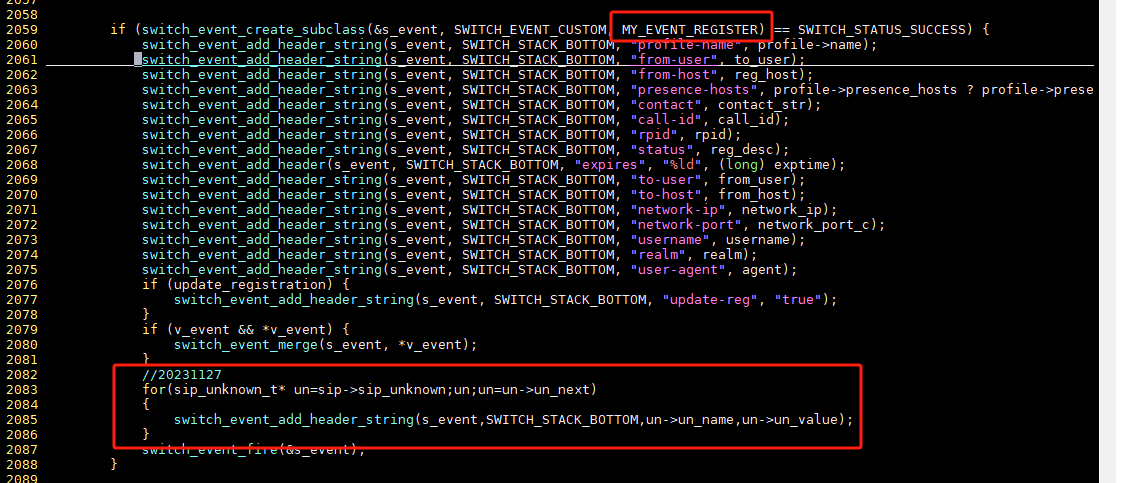
从上面的代码中,我们可以看到“sofia::register”事件中包含的所有头域内容。sofia sip协议栈会解析所有的头域,并把非标准的头域都放到“sip->sip_unknown”中。增的代码中,我们把所有unknown的头域都放到register上报事件中去。
重新加载mod_sofia模块后,可以看到注册事件中看到"X-"开头的自定义头域消息。
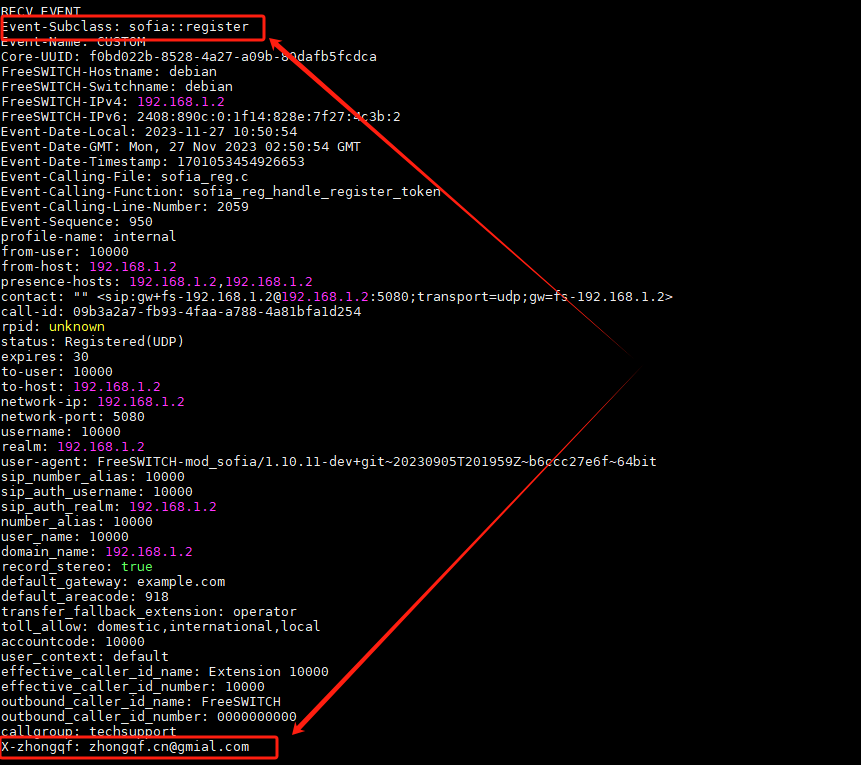
7 Endpoints媒体交互
endpoints通讯的目的就是双方都向对方推送己方的媒体数据(包括音频数据、视频数据)。Endpoints媒体的交互在被叫发送SIP/2.0 200 OK之后便开启RTP数据包推送。其中音频和视频数据是分开进行RTP打包的。而且音频RTP包和视频RTP包分别使用各自通讯端口。比如:192.168.1.2上音频RTP数据包收发端口为19132,视频RTP数据包收发端口为16610。如下图所示:
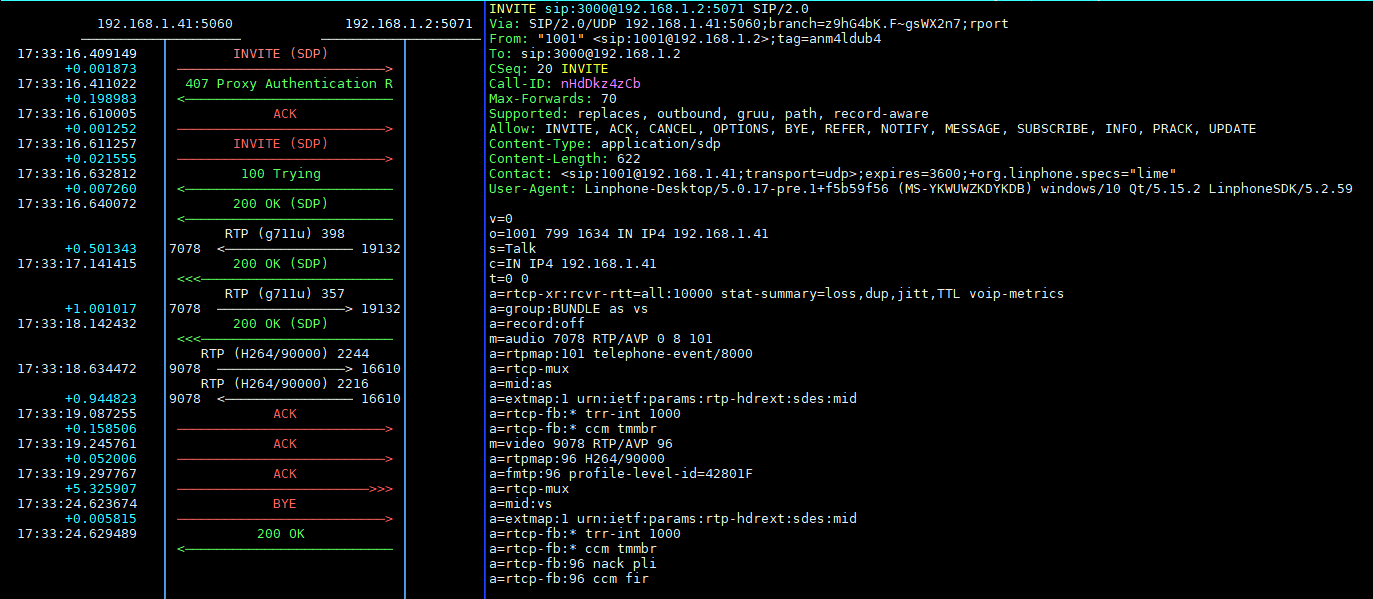
7.1 originate 流程
7.1.1 originate命令使用
originate用于发起呼叫,命令使用的基础模板:
originate ALEG BLEG
在fs_cli控制台使用的完整语法如下:
originate <call url> <exten>|&<application_name>(<app_args>) [<dialplan>][<context>] [<cid_name>][<cid_num>] [<timeout_sec>]
其中,
originate 为命令关键字,为必选字段,用于定义ALEG的呼叫信息,也就是通常说的呼叫字符串,可以通过通道变量定义很多参数;
|&<application_name>(<app_args>) 为必选字段,用于指定BLEG的分机号码或者用于创建BLEG的app(比如echo、bridge等);
[][<context>] 可选参数,该参数用于指定dialplan的context,默认值:xml default ;
[<timeout_sec>] 可选参数,该参数用于指定originate超时,默认值:60
7.1.2 originate功能入口函数
入口函数为originate_function,在 mod_commands_load 中绑定:
SWITCH_ADD_API(commands_api_interface, "originate", "Originate a call", originate_function, ORIGINATE_SYNTAX);
具体实现如下:
SWITCH_STANDARD_API(originate_function) { switch_channel_t *caller_channel; switch_core_session_t *caller_session = NULL; char *mycmd = NULL, *argv[10] = { 0 }; int i = 0, x, argc = 0; char *aleg, *exten, *dp, *context, *cid_name, *cid_num; uint32_t timeout = 60; switch_call_cause_t cause = SWITCH_CAUSE_NORMAL_CLEARING; switch_status_t status = SWITCH_STATUS_SUCCESS; if (zstr(cmd)) { stream->write_function(stream, "-USAGE: %s\n", ORIGINATE_SYNTAX); return SWITCH_STATUS_SUCCESS; } /* log warning if part of ongoing session, as we'll block the session */ if (session){ switch_log_printf(SWITCH_CHANNEL_SESSION_LOG(session),
SWITCH_LOG_NOTICE,
"Originate can take 60 seconds to complete, and blocks the existing session. Do not confuse with a lockup.\n"); } mycmd = strdup(cmd); switch_assert(mycmd); argc = switch_separate_string(mycmd, ' ', argv, (sizeof(argv) / sizeof(argv[0]))); if (argc < 2 || argc > 7) { stream->write_function(stream, "-USAGE: %s\n", ORIGINATE_SYNTAX); goto done; } for (x = 0; x < argc && argv[x]; x++) { if (!strcasecmp(argv[x], "undef")) { argv[x] = NULL; } } aleg = argv[i++]; exten = argv[i++]; dp = argv[i++]; context = argv[i++]; cid_name = argv[i++]; cid_num = argv[i++]; switch_assert(exten); if (!dp) { dp = "XML"; } if (!context) { context = "default"; } if (argv[6]) { timeout = atoi(argv[6]); } if (switch_ivr_originate(NULL, &caller_session, &cause, aleg, timeout, NULL, cid_name, cid_num, NULL, NULL, SOF_NONE, NULL, NULL)
!= SWITCH_STATUS_SUCCESS || !caller_session) { stream->write_function(stream, "-ERR %s\n", switch_channel_cause2str(cause)); goto done; } caller_channel = switch_core_session_get_channel(caller_session); if (*exten == '&' && *(exten + 1)) { switch_caller_extension_t *extension = NULL; char *app_name = switch_core_session_strdup(caller_session, (exten + 1)); char *arg = NULL, *e; if ((e = strchr(app_name, ')'))) { *e = '\0'; } if ((arg = strchr(app_name, '('))) { *arg++ = '\0'; } if ((extension = switch_caller_extension_new(caller_session, app_name, arg)) == 0) { switch_log_printf(SWITCH_CHANNEL_SESSION_LOG(session), SWITCH_LOG_CRIT, "Memory Error!\n"); abort(); } switch_caller_extension_add_application(caller_session, extension, app_name, arg); switch_channel_set_caller_extension(caller_channel, extension); switch_channel_set_state(caller_channel, CS_EXECUTE); } else { switch_ivr_session_transfer(caller_session, exten, dp, context); } stream->write_function(stream, "+OK %s\n", switch_core_session_get_uuid(caller_session)); switch_core_session_rwunlock(caller_session); done: switch_safe_free(mycmd); return status; }
调用流程如下:
originate_function => switch_ivr_originate => switch_core_session_outgoing_channel => endpoint_interface->io_routines->outgoing_channel
=> switch_core_session_thread_launch
7.1.3 switch_ivr_originate函数
该函数用于发起具体的呼叫。switch_ivr_originate函数定义:
SWITCH_DECLARE(switch_status_t) switch_ivr_originate( switch_core_session_t *session, //发起originate的channel,即 caller_channel , aleg switch_core_session_t **bleg, //originate所在的leg,会在该函数赋值 switch_call_cause_t *cause, //失败原因,会在该函数赋值 const char *bridgeto, //bleg的呼叫字符串,只读 uint32_t timelimit_sec, //originate超时时间 const switch_state_handler_table_t *table, //bleg的状态机回调函数 const char *cid_name_override, //origination_caller_id_name,用于设置主叫名称 const char *cid_num_override, //origination_caller_id_number,用于设置主叫号码 switch_caller_profile_t *caller_profile_override, //主叫的profile switch_event_t *ovars, switch_originate_flag_t flags, //originate导出的通道变量(从aleg) switch_call_cause_t *cancel_cause, // originate取消原因 switch_dial_handle_t *dh) // dial handle,功能类似呼叫字符串,可以设置多条leg同时originate
如果outgoing_channel执行成功,会在函数switch_core_session_outgoing_channel()中发送SWITCH_EVENT_CHANNEL_OUTGOING事件;并且该channel会设置上CF_ORIGINATING标识位。
if (switch_event_create(&event, SWITCH_EVENT_CHANNEL_OUTGOING) == SWITCH_STATUS_SUCCESS) { switch_channel_event_set_data(peer_channel, event); switch_event_fire(&event); }
使用switch_core_session_thread_launch()启动线程创建session :
if (!switch_core_session_running(oglobals.originate_status[i].peer_session)) { if (oglobals.originate_status[i].per_channel_delay_start) { switch_channel_set_flag(oglobals.originate_status[i].peer_channel, CF_BLOCK_STATE); } switch_core_session_thread_launch(oglobals.originate_status[i].peer_session); }
7.2 bridge流程
7.2.1 流程入口
bridge app入口(mod_dptools.c):

函数调用链:
audio_bridge_function => switch_ivr_signal_bridge or => switch_ivr_multi_threaded_bridge
uuid_bridge api入口(mod_commands.c):

函数调用链:
uuid_bridge_function => switch_ivr_uuid_bridge
7.2.2 bridge机制
注册回调函数:
static const switch_state_handler_table_t audio_bridge_peer_state_handlers = { /*.on_init */ NULL, /*.on_routing */ audio_bridge_on_routing, /*.on_execute */ NULL, /*.on_hangup */ NULL, /*.on_exchange_media */ audio_bridge_on_exchange_media, /*.on_soft_execute */ NULL, /*.on_consume_media */ audio_bridge_on_consume_media, };
状态机里面进行回调, 当channel进入CS_EXCHANGE_MEDIA状态后,回调 audio_bridge_on_exchange_media 函数,触发audio_bridge_thread线程。
7.3 媒体交互流程
7.3.1 注册编码类型
在函数mod_spandsp_codecs_load()中调用switch_core_codec_add_implementation()函数注册音频编解码。
例如添加PCMU编码
switch_core_codec_add_implementation(pool, codec_interface, SWITCH_CODEC_TYPE_AUDIO, /* enumeration defining the type of the codec */ 0, /* the IANA code number */ "PCMU", /* the IANA code name */ NULL, /* default fmtp to send (can be overridden by the init function) */ 8000, /* samples transferred per second */ 8000, /* actual samples transferred per second */ 64000, /* bits transferred per second */ mpf * count, /* number of microseconds per frame */ spf * count, /* number of samples per frame */ bpf * count, /* number of bytes per frame decompressed */ ebpf * count, /* number of bytes per frame compressed */ 1, /* number of channels represented */ spf * count, /* number of frames per network packet */ switch_g711u_init, /* function to initialize a codec handle using this implementation */ switch_g711u_encode, /* function to encode raw data into encoded data */ switch_g711u_decode, /* function to decode encoded data into raw data */ switch_g711u_destroy); /* deinitalize a codec handle using this implementation */
7.3.2 RTP数据交互及转码
函数调用链:
audio_bridge_on_exchange_media => audio_bridge_thread
收发音频数据:
audio_bridge_thread => switch_core_session_read_frame => need_codec => switch_core_codec_decode (调用implement的encode进行转码操作,比如 switch_g711a_decode) => session->endpoint_interface->io_routines->read_frame 即: sofia_read_frame => switch_core_media_read_frame => switch_rtp_zerocopy_read_frame => rtp_common_read => read_rtp_packet => switch_socket_recvfrom audio_bridge_thread => switch_core_session_write_frame => switch_core_session_start_audio_write_thread (ptime不一致时启动线程,有500长度的队列) => switch_core_codec_encode (调用implement的encode进行转码操作,比如 switch_g711u_encode) => perform_write => session->endpoint_interface->io_routines->write_frame 比如: sofia_write_frame => switch_core_media_write_frame => switch_rtp_write_frame =>switch_socket_sendto
=>rtp_common_write
8 FreeSWITCH内核与Sofia模块协同工作流程分析
FreeSWITCH 调用SIP协议栈实现SIP协议交换层级如下:
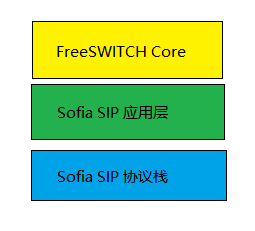
8.1 FreeSWITCH Core
8.1.1 模块加载过程
freeswitch主程序初始化时会从modules.conf.xml文件中读取配置,如果配置中如下内容生效,FreeSWITCH启动时则执行加载sofia模块操作。
<load module="mod_sofia"/>
具体过程如下:
main()
=>switch_core_init_and_modload()
=>switch_loadable_module_init()
=>switch_loadable_module_load_module_ex()// 读取xml文件并加载模块
8.1.2 状态机
8.1.2.1 状态机初始化
在如下函数中实现状态机初始化
switch_core_session_run()
8.1.2.2 改变状态机状态
通过调用switch_channel_set_state来实现状态机的状态改变。
8.1.2.3 处理状态变化
当状态发生变化后,通过switch_channel_set_running_state函数来改变running_state,并执行相关的回调来通知其状态已经发生改变:
endpoint_interface->io_routines->state_run()
主叫变化
- CS_NEW
switch_core_session_run初始状态为CS_NEW
- CS_INIT
sofia_handle_sip_i_state
case nua_callstate_received (收到invite请求) 修改状态机的状态 :CS_NEW ==> CS_INIT switch_channel_set_state(channel, CS_INIT);
switch_core_session_run
状态机处理状态变化 STATE_MACRO(init, "INIT"); on_init 即 : sofia_on_init
switch_core_standard_on_init
- CS_ROUTING
sofia_on_init
修改状态机的状态 : CS_INIT == > CS_ROUTING
switch_channel_set_state(channel, CS_ROUTING);
switch_core_session_run
状态机处理状态变化 STATE_MACRO(routing, "ROUTING"); on_routing 即 : sofia_on_routing
switch_core_standard_on_routing
- CS_EXECUTE
witch_core_standard_on_routing 修改状态机的状态 : CS_ROUTING == > CS_EXECUTE switch_channel_set_state(session->channel, CS_EXECUTE);
switch_core_session_run
状态机处理状态变化 STATE_MACRO(execute, "EXECUTE"); on_execute 即 : sofia_on_execute
switch_core_standard_on_execute
- CS_HANGUP
sofia_handle_sip_i_bye switch_channel_hangup : 即 switch_channel_perform_hangup 修改状态机的状态 channel->state = CS_HANGUP;
状态机处理状态变化 switch_core_session_hangup_state STATE_MACRO(hangup, "HANGUP");
被叫变化
- CS_NEW
switch_core_session_run初始状态为CS_NEW
- CS_INIT
sofia_outgoing_channel 修改状态机的状态 :CS_NEW ==> CS_INIT switch_channel_set_state(nchannel, CS_INIT);
状态机处理逻辑参考主叫。
- CS_ROUTING
sofia_on_init
修改状态机的状态 : CS_INIT == > CS_ROUTING switch_channel_set_state(channel, CS_ROUTING);
状态机处理逻辑参考主叫。
- CS_CONSUME_MEDIA
originate_on_routing 修改状态机的状态:CS_ROUTING -> CS_CONSUME_MEDIA switch_channel_set_state(channel, CS_CONSUME_MEDIA);
switch_core_session_run
状态机处理状态变化 STATE_MACRO(consume_media, "CONSUME_MEDIA"); on_ consume_media 即 : switch_core_standard_on_consume_media
- CS_EXCHANGE_MEDIA
switch_core_session_run
状态机处理状态变化 STATE_MACRO(exchange_media, "EXCHANGE_MEDIA"); on_exchange_media 即 : sofia_on_exchange_media
switch_core_standard_on_exchange_media
- CS_HANGUP
audio_bridge_on_exchange_media
switch_channel_hangup : 即 switch_channel_perform_hangup 修改状态机的状态 channel->state = CS_HANGUP;
状态机处理状态变化 switch_core_session_hangup_state STATE_MACRO(hangup, "HANGUP");
8.2 Sofia应用层
模块结构:
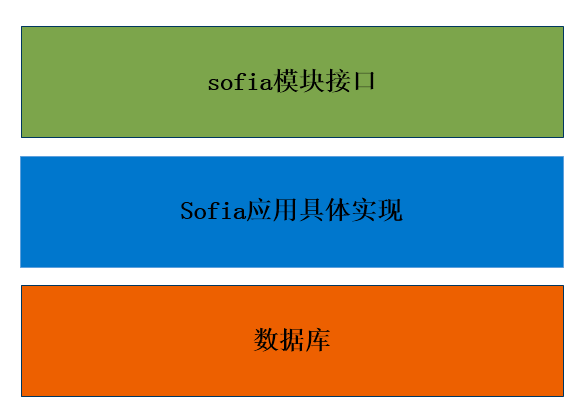
8.2.1 模块加载过程
启动事件处理线程池 :
SWITCH_MODULE_LOAD_FUNCTION(mod_sofia_load) => sofia_msg_thread_start(0); => sofia_msg_thread_run => sofia_process_dispatch_event => our_sofia_event_callback : 处理消息
启动服务器监听 :
SWITCH_MODULE_LOAD_FUNCTION(mod_sofia_load) => config_sofia(0, NULL) => launch_sofia_profile_thread => sofia_profile_thread_run => nua_create => su_home_new => nua_stack_init => nta_agent_create => nta_agent_add_tport => tport_tbind => tport_bind_server => tport_listen : 监听客户端发来的数据
8.2.2 数据库表格
freeswitch core 相关:
- aliases
- calls
- channels
- complete
- interfaces
- nat
- recovery
- registrations
- tasks
sofia相关:
- sip_authentication
- sip_dialogs
- sip_presence
- sip_registrations
- sip_shared_appearance_dialogs
- sip_shared_appearance_subscriptions
- sip_subscriptions
limit相关:
- db_data
- group_data
- limit_data
fifo相关:
- fifo_bridge
- fifo_callers
- fifo_outbound
语音信箱相关:
- voicemail_msgs
- voicemail_prefs
8.2.3 呼叫流程涉及内容
- 收到A的nua_i_invite,返回407,具体如下:
sofia_handle_sip_i_invite => sofia_reg_handle_register => sofia_reg_auth_challenge => 407
- 收到A的nua_i_invite,返回180,具体如下:
sofia_handle_sip_i_invite => sofia_reg_handle_register => sofia_reg_parse_auth
处理nua_i_state消息
sofia.c : sofia_handle_sip_i_state
mod_dialplan_xml.c : dialplan_hunt (ring_ready)
解析拨号方案,执行lua脚本,设置通道变量。
发送180事件
涉及数据表:
sip_registrations、ip_dialogs
- 发送invite给B分机,具体如下:
处理nua_r_invite消息
sofia_handle_sip_r_invite => originate_on_routing
涉及数据表:
sip_dialogs
- B应答,双方通话,具体如下
sofia_receive_message : SWITCH_MESSAGE_INDICATE_ANSWER => sofia_answer_channel => sofia_glue_tech_choose_port => sofia_glue_set_local_sdp => sofia_glue_activate_rtp
8.2.4 编码协商过程
- 先匹配freeswitch默认的codec,从加载的模块中查找支持类型的具体码率信息
sofia_handle_sip_i_invite => sofia_glue_tech_prepare_codecs => switch_loadable_module_get_codecs_sorted
- 协商发给被叫的sdp
sofia_glue_do_invite => sofia_glue_tech_prepare_codecs => switch_loadable_module_get_codecs_sorted
ocodec + codec_string
- 产生M头,并发送包含sdp的invite
sofia_glue_do_invite => sofia_glue_set_local_sdp => generate_m => nua_invite
- 协商200 OK的sdp
sofia_answer_channel => sofia_glue_tech_prepare_codecs => switch_loadable_module_get_codecs_sorted
8.2.5 媒体交互
- RTP数据交互
audio_bridge_on_exchange_media
=> audio_bridge_thread
收发音频数据
=> switch_core_session_read_frame => session->endpoint_interface->io_routines->read_frame 即: sofia_read_frame => switch_core_session_write_frame => perform_write => session->endpoint_interface->io_routines->write_frame 即: sofia_write_frame
收发视频数据
1、启动线程
=> launch_video
=> video_bridge_thread
2、收发数据
=> switch_core_session_read_video_frame =>session->endpoint_interface->io_routines->read_video_frame 即:sofia_read_video_frame => switch_core_session_write_video_frame => session->endpoint_interface->io_routines->write_video_frame 即:sofia_write_video_frame
- 终止RTP交互
audio_bridge_thread => switch_core_session_kill_channel(session_b, SWITCH_SIG_BREAK); 即 :switch_core_session_perform_kill_channel => session->endpoint_interface->io_routines->kill_channel 即 : sofia_kill_channel => switch_rtp_break
8.3 sofia协议栈
8.3.1 协议栈结构图

NUA : 基本的SIP用户代理的功能,其功能包括呼叫管理,消息和事件检索。
NTA : sofia SIP事务API(NTA)提供了简单的接口的SIP事务,传输和信息处理。
Tport : 该模块包含一个由SIP,RTSP 和HTTP协议使用的通用传输接口,这是一个协议栈和传输协议实现之间的抽象层。
8.3.2 信令流程

场景描述: A 呼叫 B ,B接通后通话一段时间后,挂断电话。
- A 发送 INVITE 请求
tport.c : tport_recv_data
nta.c : agent_recv_request
- FS回应100给A分机
nua_server.c : nua_stack_process_request
nua_server.c : SR_STATUS1(sr, SIP_100_TRYING)
nta.c : nta_incoming_treply
nta.c : incoming_reply
tport.c: tport_tsend
- FS发送认证请求给A分机
nua_application_event 处理nua_i_invite 消息 sofia.c : sofia_process_dispatch_event sofia.c : our_sofia_event_callback sofia.c : sofia_handle_sip_i_invite sofia.c : sofia_reg_handle_register sofia_reg.c : sofia_reg_auth_challenge 回复407 nua.c : nua_respond nua_stack.c : nua_signal nua_stack.c : nua_stack_signal nua_server.c : nua_stack_respond nua_server.c : nua_server_respond 发送407给A分机 nua_invite_server_respond nua_base_server_respond nta_incoming_mreply incoming_reply tport_tsend tport_resolve tport_by_addrinfo tport_prepare_and_send tport_send_msg tport_vsend sent 407 Proxy Authentication Required for INVITE (1) call state(A) : init -> received call state(A) : received -> terminated
- A分机发送ACK
nta.c : agent_recv_message
nta.c : agent_recv_request
- A分机重新发送 INVITE 请求,附加认证信息
tport.c : tport_recv_data
nta.c : agent_recv_request
- FS回应100给A分机
nua_server.c : nua_stack_process_request
nua_server.c : SR_STATUS1(sr, SIP_100_TRYING)
nta.c : nta_incoming_treply
nta.c : incoming_reply
tport.c: tport_tsend
- FS发送 INVITE 给 B分机
switch_ivr_originate.c : switch_ivr_originate
sofia_on_init
sofia_glue_do_invite
nua_invite : nua_r_invite 消息
nua_signal
sofia.c : sofia_process_dispatch_event
sofia.c : our_sofia_event_callback
sofia.c : sofia_handle_sip_r_invite
sofia_on_init
sofia_on_routing
switch_ivr_originate.c :originate_on_routing
nua_stack_signal
nua_stack_invite
nta_leg_tcreate
执行发送invite请求
nta.c : outgoing_send
tport_tsend
call state(B) : init -> calling
- B分机回应180给FS
tport_recv_event
agent_recv_response
处理 nua_r_invite 消息
sofia.c : sofia_process_dispatch_event
sofia.c : our_sofia_event_callback
sofia.c : sofia_handle_sip_r_invite
call state(B) : calling -> proceeding
- FS发送180给A分机
nua_session.c : signal_call_state_change
nua_stack_tevent : nua_i_state
nua_application_event
处理nua_i_invite 消息
sofia.c : sofia_process_dispatch_event
sofia.c : our_sofia_event_callback
sofia.c : sofia_handle_sip_i_invite
sofia_reg.c : sofia_reg_handle_register
sofia_reg.c : sofia_reg_parse_auth
处理nua_i_state消息
sofia.c : sofia_handle_sip_i_state
mod_dialplan_xml.c : dialplan_hunt (ring_ready)
解析拨号方案,执行lua脚本,设置通道变量。
发送180
switch_channel_mark_ring_ready
nua_invite_server_respond
nua_base_server_respond
nta_incoming_mreply
incoming_reply
tport_tsend
tport_resolve
tport_by_addrinfo
tport_prepare_and_send
tport_send_msg
tport_vsend
call state(A) : init -> received
- B发送200 ok
tport_recv_event
agent_recv_response
处理 nua_r_invite 消息
sofia.c : sofia_process_dispatch_event
sofia.c : our_sofia_event_callback
sofia.c : sofia_handle_sip_r_invite
call state(B) : proceeding -> completing
- FS发送ACK给B
nua_ack nua_signal : nua_r_ack outgoing_send tport_tsend
call state(A) : received -> early call state(B) : completing -> ready
- FS发送200 OK给A
sofia_glue_tech_set_codec switch_rtp_create sofia_glue_negotiate_sdp sofia_glue_activate_rtp switch_channel_perform_answer : SWITCH_MESSAGE_INDICATE_ANSWER switch_channel_perform_mark_answered auto_record.lua : 执行录音操作B auto_record.lua : 执行录音操作A sofia_receive_message (SWITCH_MESSAGE_INDICATE_ANSWER) 发送200 OK nua_respond : 200 nua_signal : nua_r_respond nua_stack_signal nua_stack_respond nua_server_respond nta_incoming_treply nta_incoming_mreply incoming_reply tport_tsend call state(A) : early -> completed
- A回应ACK
nta.c : agent_recv_message
nta.c : agent_recv_request
call state(A) : completed -> ready
- 通话一段时间后,A主动发送BYE
tport_recv_event
agent_recv_message
agent_recv_request
sofia_on_hangup
- FS发送BYE给B
nua_bye : nua_r_bye
nua_stack_signal
outgoing_send
tport_tsend
- FS发送200 OK给A
nta : sent 200 OK for BYE tport_tsend call state(A) : ready -> terminating call state(A) : terminated
B发送200 OK给FS,回应挂断请求
nta: received 200 OK for BYE 状态变化: call state(B) : ready -> terminating call state(B) : terminating -> terminated





【推荐】国内首个AI IDE,深度理解中文开发场景,立即下载体验Trae
【推荐】编程新体验,更懂你的AI,立即体验豆包MarsCode编程助手
【推荐】抖音旗下AI助手豆包,你的智能百科全书,全免费不限次数
【推荐】轻量又高性能的 SSH 工具 IShell:AI 加持,快人一步
· Manus重磅发布:全球首款通用AI代理技术深度解析与实战指南
· 被坑几百块钱后,我竟然真的恢复了删除的微信聊天记录!
· 没有Manus邀请码?试试免邀请码的MGX或者开源的OpenManus吧
· 园子的第一款AI主题卫衣上架——"HELLO! HOW CAN I ASSIST YOU TODAY
· 【自荐】一款简洁、开源的在线白板工具 Drawnix